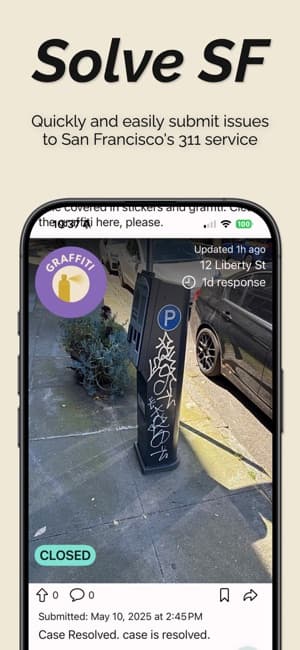Solve SF App Captures 37% of Daily 311 Reports, Sets New Record Amid Imminent Shutdown

San Francisco, CA – The independent civic engagement application, Solve SF, announced a new milestone today, reporting that its platform was responsible for 37% of all 311 service requests submitted to the city. This significant surge in usage, touted as a "new record" by the app's developer, comes just days before the city's planned discontinuation of the Open 311 API, which the app relies on. The tweet from Solve SF stated, > "37% of all 311 reports today were made with Solve SF. New record!"
Launched in January 2025 by electrical engineer Patrick McCabe, Solve SF quickly gained traction as an AI-powered alternative to the official San Francisco 311 app. It streamlines the reporting process for issues like graffiti, illegal parking, and street cleaning, allowing users to submit reports in seconds by simply taking a photo, with AI automatically filling in details. McCabe, who left his engineering job to focus on the app, designed it to be significantly faster and more user-friendly than the city's existing platform.
Despite its growing popularity and efficiency, the San Francisco Administrator's office informed McCabe on May 13 that the Open 311 API would be shut down on July 12, 2025. The city cited high maintenance costs and the API's obsolescence as reasons for the closure, noting that Solve SF is currently its sole user. This decision would effectively render Solve SF inoperable, a move McCabe described as causing the app to "cease to exist."
The impending shutdown has drawn criticism from users and prominent figures, including Yelp CEO Jeremy Stoppelman, who lauded Solve SF's utility. Users praise the app for its ease of use, with many finding it superior to the official 311 app, which can be clunky and time-consuming. While Solve SF accounted for approximately 7% of overall 311 reports earlier this year, today's record-setting 37% highlights a clear and recent increase in its adoption and perceived value among San Francisco residents.
The record-breaking usage just days before its potential demise underscores the app's impact on civic engagement and raises questions about the city's approach to third-party innovation. As the July 12 deadline approaches, the future of Solve SF and its simplified reporting mechanism remains uncertain, despite its demonstrated ability to drive significant citizen participation in addressing urban issues.